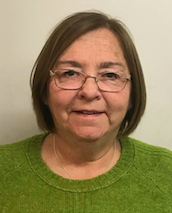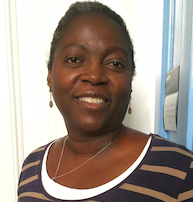Steering Group
Who we are
The Centre for Academic Primary Care (CAPC) Patient and Public Involvement and Engagement (PPIE) Steering Group provides advice and guidance on how we approach public involvement and engagement and help to develop our longer terms plans.
Membership staff

Why did you decide to be a member of the CAPC Patient and Public Involvement and Engagement Steering Group?
As the lead for public involvement and engagement, it is really important that I hear the views and experiences of members of the public, staff, and students. Understanding their perspectives helps to ensure that our public involvement plans and activities are practical and inclusive.
What does good Patient and Public Involvement and Engagement mean to you?
For me good public involvement and engagement is about working in partnership with people and communities. It involves valuing everyone’s time and perspectives and incorporating the learning from their experiences into our research. Ultimately, this will help us to design and carry out research that has the potential to benefit everyone.
What experience do you have?
I have twenty years’ experience of working with members of the public and involving them in decision-making. I’ve worked in lots of different settings from youth centres to universities. To give a few examples, I have involved the public in research, planning park improvements, developing health educational resources, and developing a UK-wide involvement service for children and young people with cancer. Even so, I still learn something new about working with the public every day.
Patient and Public Involvement and Engagement Advisor
The role of the advisor is to strengthen and embed best practice in patient and public involvement and engagement at CAPC, by guiding and supporting researchers to:
- form successful partnerships with members of the public;
- involve the public in deciding on research questions, planning, and design;
- find public contributors to be involved throughout the study, share research findings and plan future research;
- ensure that patient and public involvement and engagement is inclusive of people from a diverse range of backgrounds and experiences.
Contact Alisha Newman via Email: capc-ppi@bristol.ac.uk or phone: 0117 455 9129

Why did you decide to be a member of the CAPC Patient and Public Involvement and Engagement Steering Group?
My research over the years on domestic abuse has showed me that people affected have a history of often not seeing the benefits of research nor the outcomes that are of greatest interest to them. I am keen to improve real-world research relevance and reach across our Centre.
What does good Patient and Public Involvement and Engagement mean to you?
I believe that strong public and patient involvement needs to be threaded throughout research. Good patient and public involvement and engagement creates on-going dialogues and learning opportunities for both researchers and members of the public.
What experience do you have?
As a researcher, I have worked closely with experts with lived experience in the past 15 years. Many questions and uncertainties about our research on domestic violence and abuse were resolved through involvement of the public.

Why did you decide to be a member of the CAPC Patient and Public Involvement and Engagement Steering Group?
I lead the patient and public involvement work in the TOPIC programme (Transforming Outcomes for Paediatric allergy In Primary care) and I'm very keen to learn from the excellent patient and public involvement and engagement work that CAPC does.
What does good Patient and Public Involvement and Engagement mean to you?
To me, good public involvement means aligning with the UK Standards for Public Involvement, which emphasise collaboration, inclusivity, and respect.
What experience do you have?
I have experience working on projects that had patient and public involvement and engagement activities led by teams at both CAPC and ARC West. This has given me valuable insights into the best practices of involving the public in research. I try to learn from and emulate the fantastic work of my colleagues.

Why did you decide to be a member of the CAPC Patient and Public Involvement and Engagement Steering Group?
I decided to be part of the steering group because I am passionate about making research as inclusive as possible. In the past research has lacked diversity and it is important to work with the public, to ensure research topics are important to the public, and solutions are appropriate. There is minimal benefit to conducting research without this impact, and patient and public involvement and engagement is essential when designing and conducting good quality research.
What does good Patient and Public Involvement and Engagement mean to you?
Good public involvement and engagement is a key component of high-quality research. It should be part of the research from the outset and integrated into all aspects, from the design, to conducting, to interpreting the results. Good quality patient and public involvement should be inclusive and diverse, ensuring that as many perspectives as possible are considered.
What experience do you have?
As a PhD researcher, patient and public involvement and engagement is integral to my research. I have formed an advisory group, of up to 6 members of the public, with African or Asian heritage, to support my research project. These members of the public guide how I investigate my research topic, of health inequities between different ethnic groups with regards to respiratory healthcare treatment and management in primary care.
Membership public members

Why did you decide to be a member of the CAPC Public and Public Involvement and Engagement Steering Group?
I felt that I had a lot of relevant experiences to contribute to discussions about health issues and also how to get different people involved in PPI. I was quite concerned when I first started doing PPI that almost all the contributors were very similar to those carrying out the research and that this would not give a true and full picture of what patients and the public thought. I have had a wide range of experiences in my life and career ensuring that I have connections with, and knowledge of, a wide range of people and organisations in Bristol who could be involved in PPI, improving the results. While on the Steering Group a focus for me has been improving diversity. There are still improvements to be made but I have seen real progress both within research in CAPC and in the wider research field. PPI is now seen as integral to the research process and a diversity of voices is becoming the norm.
What does good Patient and Public Involvement and Engagement mean to you?
For me good patient and public involvement has to be real. It needs to include a range of people, some who have relevant experience and others who do not. Things have to be put in place to ensure that PPI sessions are accessible for everyone and that everyone can contribute if they wish to. The researchers need to take the patient and public involvement contributors seriously and not patronise them. Contributors must be able to influence the direction of the research, the patient and public facing documents, the results and dissemination of the results. Ideally PPI contributors will be part of the research team and co-produce the research. Research can only be meaningful if it addresses the needs of the people it concerns. It needs to be to be carried out with communities and not done to them.
What experience to you have?
I have been involved in a variety of studies over the last 10 years including: poly-pharmacy, end of life and palliative care, support for survivors of domestic abuse, a tool for informing GPs of your issues before an appointment (COAC), diabetes (BOX), ACCESS, paramedics and end of life planning, monitoring tests for long-term conditions, reducing antibiotic resistance in UTIs and many others. I have been on the CAPC PPI Steering Group for 8 years. I have taken part in group discussions, as well as on local advisory or steering groups, on a national steering group and recently in co-production. I am co-chair of the HPRU in behavioural Science and Evaluation PPI steering group. I am a member of the PPI group of the Exeter Evidence Synthesis Group (ESG) and a steering group patient and PPI member of the Bristol ESG group. I was part of the research Development service PPI group and management group and I am now part of the Research Support Service in Public health PPI group.
I review research grant applications for the ICB, the RSS and Southmead hospital Trust. I have reviewed grant applications for CAPC and the NIHR.

Why did you decide to be a member of the CAPC Public and Public Involvement and Engagement Steering Group?
My family has experienced chronic health problems and I think that the voices of patients, carers and the wider community should be heard by those designing and undertaking health research.
What does good Patient and Public Involvement and Engagement mean to you?
Ordinary people from diverse backgrounds are given the opportunity to influence the questions addressed in health research and the way research is designed, conducted and presented to the public.
What experience do you have?
I have a background in life sciences and worked in NHS and research laboratories for over 20 years. More recently I have worked in community development and have experience in working with small groups.

Why did you decide to be a member of the CAPC Public and Public Involvement and Engagement Steering Group?
I have had a long-standing interest in patient and public involvement in health and social care research, from the perspective of primary care patient, interested member of the public and as a one-time academic researcher myself.
What does good Patient and Public Involvement and Engagement mean to you?
Embedding the lay perspective and patient and public priorities in the research cycle and process from the outset. Good patient and public involvement and engagement involves an active reciprocal expertise and information exchange between professionals and lay contributors.
What experience do you have?
After a career in local government spanning thirty years, I changed tack completely in 2005 and left to pursue my academic interests in experimental cognitive psychology through a Master's and PhD research. I am now a research and evaluation consultant, with a particular interest in quality improvement, mainly within the fields of mental health and community health services.

Why did you decide to be a member of the CAPC Public and Public Involvement and Engagement Steering Group?
Primary care is an area that is relevant to us all and I wanted to be able to use my personal experiences to influence the research that comes up in this area so that it takes into account a range of views. I belong to a number of underserved groups so I think it's especially important to voice what may be particularly relevant and/ or specific barriers for these communities so that they aren't unintentionally excluded when research is designed and carried out.
What does good Patient and Public Involvement and Engagement mean to you?
Good patient and public involvement and engagement involves meaningful collaboration between researchers and the public/patients, where both are valued for their contributions and able to impact the decision-making process (research design, conduct and outcomes). It is about taking the time to build relationships with individuals and groups who would be affected by the research and making that research accessible and useful.
What experience do you have?
My background, both professionally and on a more personal level, is within mental health and disability. I have a lot of experience of living with long-term health conditions as well as supporting people in similar situations (as a carer and also charity volunteer). This has given me great insight into what wellbeing and recovery mean, especially from a patient and public perspective.
I also work with and volunteer for a number of other organisations related to patient and public involvement and engagement, helping with everything from creating public-facing materials to analysing research data and advising on national strategy.
